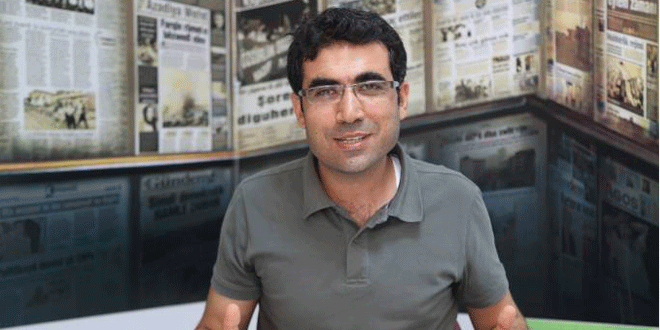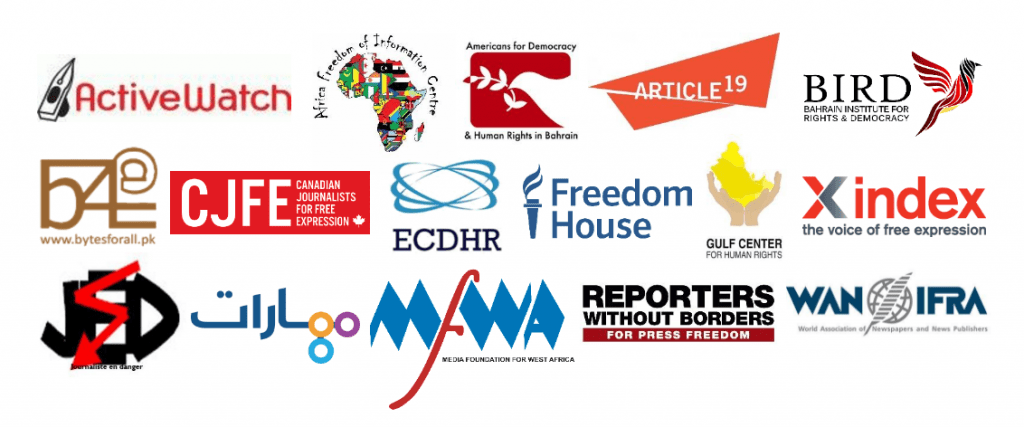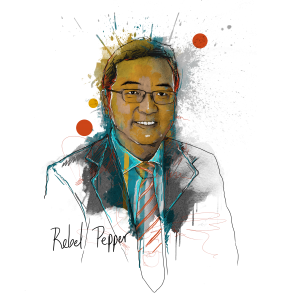Index relies entirely on the support of donors and readers to do its work.
Help us keep amplifying censored voices today.
[vc_row][vc_column][vc_column_text]
“Of course my family are worried. Who in this country isn’t worried?” says Ramazan Ölçen, who was detained for owning the copyrights to Azadiya Welat (Freedom of the country), what was Turkey’s only Kurdish-language daily newspaper. It was shut down by a cabinet decree issued under Turkey’s state of emergency, which has been in place since 20 July 2016.
“On 4 March 2017, at around 6am, special operations officers and counterterrorism police raided my house [in Diyarbakır], which was completely unnecessary,” he says. “I would have voluntarily gone and testified if the prosecutor’s office had sent me a notice.”
Ölçen’s wife was terrified by the “special operations officers wearing masks on their faces and sporting automatic rifles” he says. “Honestly, I too was afraid.”
The couple’s one-year-old was spared that fear as he was asleep throughout. “He didn’t wake up to all that noise,” Ölçen says.
The officers searched the house for about an hour but found no evidence of a crime. They seized Ölçen’s mobile phone and he was taken into custody. He was held for two days and released on 6 March, but his family are still deeply worried.
“Detention was a situation we did anticipate, yet we were still surprised [by the raid],” he says.“We were expecting it because they were rounding up everyone whose name appeared in the mastheads of the press organisations that were shut down under Cabinet decrees to testify.”
From teaching French to Azadiya Welat
Ölçen was born in 1981 in the Silvan district of Diyarbakır. He graduated in French from Dicle University in 2003. For three years, he taught French at various schools as a contract teacher. “In 2006 I gave up teaching and chose not to renew my contract. Of course, school principals who didn’t deem contract teachers as teachers played a role in my decision. As did local education directors, ministry bureaucrats, education ministers and the government’s overall education policies.”
In 2008 Ölçen started working as a journalist at Azadiya Welat. He assumed many roles until the newspaper’s closure, from news editor and editor of culture and arts to editor of the language and literature pages.
In 2014 the formal owner of Azadiya Welat parted ways with the newspaper. Ölçen assumed the responsibility and became the formal owner of the copyrights of Zozan Publishing, the publishing group under which Azadiya Welat was published. “As such, my name formally entered the masthead of the newspaper of Apê Musa,” Ölçen said, referring to Musa Anter, a Kurdish dissident intellectual and writer, who was assassinated in 1992, often referred to as “apê” (uncle), a word of both affection and esteem.
“This was a source of immense pride for me and until the day it was shut down with a cabinet decree I tried my best to be worthy of the tradition of Apê Musa in terms of serving the Kurdish language.”
At Azadiya Welat, the day started with the editorial morning meeting. In addition to journalism and editing, Ölçen was in charge of administrative affairs. They worked hard to meet the printing deadlines.
On 28 August 2016 the police raided the newspaper’s head office in Diyarbakır, detaining 25 of its employees. The newspaper was then only “temporarily” shut down. A new decree shuttered it permanently in October of the same year.
A troubled history
When the newspaper was closed, Ölçen started working as a freelance journalist, as did around 3,500 other former employees.
Recently, Ölçen started working as an editor for the Kurdish language newspaper Rojeva Medya, which started publishing after Azadiya Welat’s closure. Rojeva is not a direct successor, Ölçen says, most of its employees are former Azadiya Welat journalists, and the two have very similar editorial policies.
Azadiya Welat, which had been in print for 21 years, was no stranger to suppression. As a Kurdish outlet, even before the state of emergency, it was constantly harassed by authorities, its journalists routinely imprisoned and tried. It was shut down and reopened countless times. Currently, ten of its journalists and distributors are in prison, most of them serving convictions issues before the coup attempt.
Many of its journalists have been in and out of jail since that first raid in August 2016, but the price the newspaper has paid in its nearly a quarter of a century history has been much higher than that.
In 2010, Metin Alataş, an Azadiya Welat distributor, was found hanging dead from an orange tree in Adana. In 2014, Kadri Bağdu, a distributor for Azadiya Welat was murdered in an armed attack.
More recently, Azadiya Welat journalist Rohat Aktaş was killed during a curfew in the southeastern town of Cizre while he was reporting on the security forces’ operations in the area. Aktaş was allegedly killed along with many other civilians who were hiding in a residential basement where they had taken refuge from the shelling in February 2016. But the authorities wouldn’t leave him alone after his death. On 7 March the Diyarbakır Prosecutor’s Office launched criminal proceedings against Aktaş. The prosecutor asked for up to seven years on terrorism-related charges for the slain journalist.
Not surprisingly, Kurds have had more than their fair share of difficulties since Turkey’s 15 July coup attempt. Many pro-Kurdish outlets have been shut down under Turkey’s state of emergency, which was itself extended this week for another three months. The ban on the Kurdish language seems to be making a de-facto comeback. With Turkey’s 16 April referendum expected to turn the country even more authoritarian, the prospects for any minority outlets being able to thrive seems slim. Will things ever improve for the country’s Kurdish media?
Ölçen is not entirely optimistic. “However, I am not completely hopeless either. There have always been pressures and there always will be. But there has also always been resistance against pressure, and those will also always be.”[/vc_column_text][vc_column_text]

[/vc_column_text][/vc_column][/vc_row][vc_row][vc_column][vc_basic_grid post_type=”post” max_items=”4″ element_width=”6″ grid_id=”vc_gid:1493282486109-b08bdef5-201d-8″ taxonomies=”8607″][/vc_column][/vc_row]
Index on Censorship, a group that campaigns for free expression globally, announced the 2017 winners of its freedom of expression awards in London on Wednesday. The four winners were drawn from more than 400 nominations. Read the full article
[vc_row][vc_column][vc_column_text]
To: Sheikh Hamad bin Isa Al Khalifa
King of Bahrain
CC: Hon. Zeid Ra’ad Zeid al-Hussein
High Commissioner for Human Rights
Ms. Frederica Mogherini
High Representative of the European Union for Foreign Affairs and Security Policy
Mr. Sigmar Gabriel
Vice-Chancellor and Foreign Minister of the Federal Republic of Germany
Mr. Rex W. Tillerson
United States Secretary of State
The Right Honorable Boris Johnson
Foreign & Commonwealth Office of the United Kingdom
Mr. Jean-Marc Ayrault
Minister of Foreign Affairs of France
King Hamad,
We, the undersigned, express our deep concern with the government of Bahrain’s continued targeting of journalists, which further restricts free press and expression in the country. On 23 April 2017, the court of appeals will hold another hearing for Sayed Ahmed Salman al-Mousawi, an internationally-renowned photographer, after he was arrested more than three years ago for alleged terrorist activities. The government’s repeated harassment of al-Mousawi and other journalists highlight the ongoing censorship and restrictions on free press and expression in Bahrain.
Sayed Ahmed Salman al-Mousawi is a 29-year-old freelance photographer who has won 169 international photography prizes—a number of which he even won while in detention. He is a member of FIAP, PSA, UPI and Qatif photos.
Authorities arrested al-Mousawi, along with his brother Sayed Mohammed, on 10 February 2014 from their home in Duraz. The plain-clothes masked policemen did not present any arrest warrant and confiscated his cameras and electronic devices. After holding al-Mousawi for six days, officials transferred him to Dry Dock prison. Security forces then took him to the Criminal Investigations Directorate (CID) for another six days where they tortured him “cruelly without mercy,” as he later told his father. Security officers hung him on a door four times, electrocuted him, and did not allow him to sit for four days. They stripped him naked, beat him and sexually assaulted him. No independent investigation into his torture allegations has ever been conducted.
Al-Mousawi spent over nine months in detention without official charges against him. At his first trial on 24 December 2014, the prosecutor charged him with forming and participating in a terror cell, accusing him of providing SIM cards to protesters —“terrorists”—and taking photos of anti-government demonstrations. He and other witnesses denied that he had anything to do with the riots. Over the course of 2015, officials postponed his trial six times. Meanwhile, the government continued to deny him his basic human rights, including restricting access to a lawyer, placing him in solitary confinement, and denying family visits.
On 23 November 2015, the Bahraini court sentenced al-Mousawi to 10 years imprisonment and revoked his citizenship. However, the Court of Cassation overturned the ruling earlier this year. His postponed appeal hearing next month provides an opportunity to end his prolonged arbitrary detention and mistreatment. Al-Mousawi has now been held arbitrarily for over three years, merely for exercising his right to free expression.
Al-Mousawi’s case is representative of the Bahraini government’s growing repression against basic civil rights. We, the undersigned, have raised our concern over numerous cases of torture, arbitrary detention, unfair trials, and trumped up terrorism charges used to restrict expression unfavourable to the government. Journalists, bloggers, online activists and human rights defenders such as Faisal Hayyat, Nazeeha Saeed, and Nabeel Rajab, among others, have increasingly come under attack by authorities since the 2011 pro-democracy protests. Arbitrary arrests of journalists, systematic torture and impunity have turned Bahrain into a dangerous country for those who speak out. The country is ranked 162nd out of 180 countries in Reporters Without Borders’ (RSF) 2016 World Press Freedom Index and has become one of the biggest detainers for journalists and bloggers with at least 14 behind bars as of today.
Furthermore, the government has also censored and restricted the media, most recently in January, temporarily suspending the online version of Alwasat, the only independent newspaper in the country. Through a combination of media and counterterrorism legislation, as well as excessive government oversight, to justify their actions against the press and journalists, Bahraini officials continue to act with impunity.
The targeting and judicial harassment of journalists simply performing their work is unacceptable and violates international human rights standards. Bahrain is a signatory to the International Covenant on Civil and Political Rights (ICCPR), which states in Article 19 that “Everyone shall have the right to freedom of expression.” This includes the requirement that “a free press and other media [be] able to comment on public issues without censorship or restraint and to inform public opinion.” The pattern of reprisals and suppression of freedom of express far exceeds the limited restrictions placed on this right under article 19.3.
We, the undersigned, raise our concerns about restrictions on free press and expression in Bahrain and call on the Bahraini government to:
Signed,
ActiveWatch (Romania)
Africa Freedom of Information Centre
Americans for Democracy & Human Rights in Bahrain (ADHRB)
Article 19
Bahrain Institute for Rights and Democracy (BIRD)
Bytes for All, Pakistan
Canadian Journalists for Free Expression
European Center for Democracy and Human Rights
Freedom House
Gulf Center for Human Rights
Index on Censorship
Journaliste en Danger (JED)
Maharat Foundation
Media Foundation for West Africa
Reporters Without Borders (RSF)
World Association of Newspapers and News Publishers[/vc_column_text][/vc_column][/vc_row][vc_row][vc_column][vc_basic_grid post_type=”post” max_items=”4″ element_width=”6″ grid_id=”vc_gid:1492705737868-c65e7005-0971-10″][/vc_column][/vc_row]
[vc_row][vc_column][vc_video link=”https://www.youtube.com/watch?v=-8V1Hm2Za2w”][vc_column_text] Wang Liming, better known under the pseudonym Rebel Pepper, is one of China’s most notorious political cartoonists. For satirising Chinese Premier Xi Jinping and lampooning the ruling Communist Party, Rebel Pepper has been repeatedly persecuted. In 2014, he was forced to remain in Japan, where he was on holiday, after serious threats against him were posted on government-sanctioned forums. The Chinese state has since disconnected him from his fan base by repeatedly deleting his social media accounts, he alleges his conversations with friends and family are under state surveillance, and self-imposed exile has made him isolated, bringing significant financial struggles. Nonetheless, Rebel Pepper keeps drawing, ferociously criticising the Chinese regime.
Wang Liming, better known under the pseudonym Rebel Pepper, is one of China’s most notorious political cartoonists. For satirising Chinese Premier Xi Jinping and lampooning the ruling Communist Party, Rebel Pepper has been repeatedly persecuted. In 2014, he was forced to remain in Japan, where he was on holiday, after serious threats against him were posted on government-sanctioned forums. The Chinese state has since disconnected him from his fan base by repeatedly deleting his social media accounts, he alleges his conversations with friends and family are under state surveillance, and self-imposed exile has made him isolated, bringing significant financial struggles. Nonetheless, Rebel Pepper keeps drawing, ferociously criticising the Chinese regime.
笔名为“变态辣椒” 的王立铭是一位来自中国大陆的漫画家,以其反共讽刺性漫画而闻名。他因为讥讽习近平以及中国共产党而一而再再而三地受政府迫害。2014年5月,王立铭在旅游日本期间因在中国大陆官媒《人民网》受威胁儿被迫居留日本。中国大陆因想断绝王立铭与其粉丝的关系而删除他社交媒体的账号。他声称与亲戚朋友的交谈总是被监视。他也因为长期独自流亡国外而渐渐地与世隔绝, 陷入经济困境。然而,他并没有放弃以他讽刺性的漫画讥讽共产党。
“Since 2010, I have been adhering to the use of cartoons as a weapon against the Communist Party of China’s totalitarianism. The CPC’s blockade and crackdown on freedom of expression has never ceased. Their persecution against me has not stopped.” — Rebel Pepper[/vc_column_text][/vc_column][/vc_row][vc_row][vc_column][vc_basic_grid post_type=”post” max_items=”12″ style=”load-more” items_per_page=”4″ element_width=”6″ grid_id=”vc_gid:1501084482480-564597df-b0b6-3″ taxonomies=”9021″][awards_fellows years=”2017″][/vc_column][/vc_row]